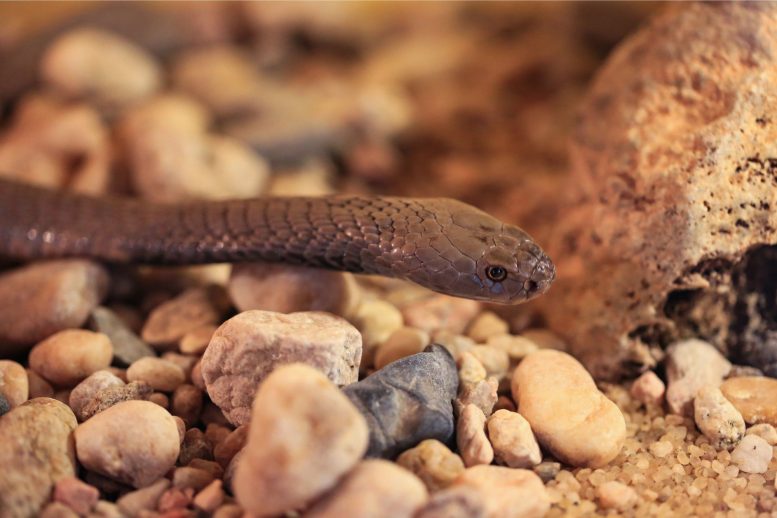
Scientists have developed a pioneering treatment for snakebites that effectively prevents the severe tissue damage inflicted by the venom of African spitting cobras.
Spitting cobra venom is incredibly potent and causes dermonecrosis, which presents as rapid destruction of skin, muscle, and bone around the site of the snakebite, and can lead to permanent injuries and disfigurements, including limb loss and amputations in extreme cases.
Professor Nicholas Casewell and Liverpool School of Tropical Medicine colleagues including Dr. Steven Hall — who is now at Lancaster University — discovered that using the repurposed small molecule drug varespladib to block one of the two major dermonecrosis-causing toxins in spitting cobra venom prevents skin and muscle damage.
Each year, it is estimated that snakebite causes long-term detrimental effects in around 400,000 people across the world, with a substantial proportion of those in Africa the result of spitting cobra bites.
The Impact of Spitting Cobra Venom
Currently, there is no effective treatment for tackling severe local envenoming caused by spitting cobra venom. Existing antivenoms only work on bites by other snake species and are often ineffective for treating local envenoming because antivenom antibodies are too large to effectively penetrate into the region around the bite site.
Professor Nicholas Casewell of LSTM said: “Our findings hold much promise to improve the treatment of tropical snakebite. Current treatments for spitting cobra bites are widely regarded as being ineffective, meaning that rates of disability and amputation have remained high across much of Africa. Our data shows that blocking just one of the main toxin families in spitting cobra venom will likely prevent the debilitating tissue damage seen in thousands of snakebite patients each year.”
Professor Casewell’s team, led by PhD student Keirah Bartlett and Dr. Steven Hall, then of LSTM and now at Lancaster University, and also involving researchers from Canada, Denmark, Costa Rica, and the USA, first analyzed spitting cobra venom to identify the toxins responsible for causing venom-induced dermonecrosis. The results showed that cytotoxic three-finger toxins (CTx) are largely responsible but that phospholipases A2 (PLA2) toxins play a critical role in the process.
Local injection of the PLA2-inhibiting drug varespladib reduced the extent of dermonecrosis, even when delivered up to an hour after the venom, and the protection conferred by the drug also extended to venom-induced muscle toxicity.
Promising Results and Future Directions
According to the authors, the findings suggest that varespladib could become an invaluable treatment against the tissue-damaging effects of black-necked and red-spitting cobra venoms, which cause extensive morbidity in snakebite victims across the African continent.
Lead author Keirah Bartlett said: “These findings are extremely promising, not only does this offer up a new mode of treatment where previously nothing effective existed, but because varespladib has already gone through testing in human clinical trials, including for snakebite, it could be available for use in real-world patients very soon.”
Dr. Hall added: “Snakebite is a devastating neglected tropical disease, with tissue destruction caused by necrotic snake venoms permanently injuring hundreds of thousands of victims every year. Our work shows that the repurposed drug, Varespladib, is incredibly effective at inhibiting such necrosis caused by African spitting cobras; an exciting finding as their venoms are particularly fast-acting and destructive. We hope this work helps pave the way to future snakebite therapies that can save the lives and limbs of victims worldwide.”
Professor Casewell’s team is already looking for viable treatments that effectively block the venom CTx. Having treatments available against both toxins has the potential to enhance the potency of varespladib, and could significantly reduce the long-term morbidity associated with spitting cobra bites in Africa and beyond.
Reference: “Dermonecrosis caused by a spitting cobra snakebite results from toxin potentiation and is prevented by the repurposed drug varespladib” by Keirah E. Bartlett, Steven R. Hall, Sean A. Rasmussen, Edouard Crittenden, Charlotte A. Dawson, Laura-Oana Albulescu, William Laprade, Robert A. Harrison, Anthony J. Saviola, Cassandra M. Modahl, Timothy P. Jenkins, Mark C. Wilkinson, José María Gutiérrez and Nicholas R. Casewell, 30 April 2024, Proceedings of the National Academy of Sciences.
DOI: 10.1073/pnas.2315597121